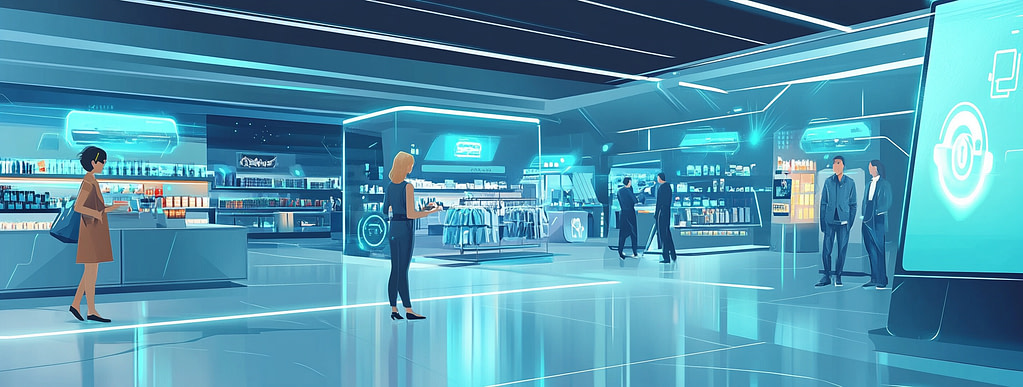The Ultimate Guide to Success with AI Agents

We’ve been seeing AI evolve right before our eyes for the last few years. Met with much apprehension at first, we’re learning how beneficial it can be to integrate AI into our business models for increased productivity and efficiency.
People used to think that AI was coming through to take our jobs, but honestly, they can make our jobs much easier if used correctly. There are some things to consider, but if executed properly, we can reach heights we never thought possible with the assistance of AI agents.
What Are AI Agents?
AI agents are artificial intelligence systems designed to do all kinds of things for us. They can make decisions, answer questions, help you solve problems, and more. The sky is really the limit when you consider all the ways that you can train them.

Let’s use your home as an example. A smart home that uses Alexa can effectively control your lighting, security, and climate control. When it comes to business, while an AI agent sorts your emails and manages your schedule, you can focus on more intricate problems. These agents can be either physical, like robots, or software-based, fitting different needs.
Understanding AI Agent Technology
AI agents learn by studying lots of examples (that’s called machine learning) and by understanding and talking in human language (that’s natural language processing). We start out by teaching the agents and putting them through multiple rounds of practice as they’re learning the skills we want them to acquire.
They’ll eventually start to figure stuff out on their own, without someone having to guide it each time. The eventuality is a customer service robot that can work around the clock to assist consumers, or an AI financial advisor that can offer real-time advice.
There are different types of agents, each with its own special skills. If you want to get your AI agent up and running, you have to pick the right tools and implement the correct strategies.
How AI Agents Work
The agent function is what changes data into actions that line up with the agent’s goals, guided by algorithms and machine learning models that direct their choices.
Memory systems play a big role by helping these agents work together and recall past interactions, which improves performance by staying organized and avoiding saying the same thing over and over.
Types of AI Agents
AI agents can be categorized into various types:
- Simple Reflex Agents: React to specific stimuli based on set rules, like a thermostat adjusting temperature.
- Model-Based Agents: Use a model of the world to improve responses by considering past experiences.
- Goal-Based Agents: Focus on achieving specific goals by evaluating the current state and possible actions.
- Utility-Based Agents: Aim to maximize satisfaction by evaluating different outcomes based on user criteria.
- Learning Agents: Continuously improve by learning from past interactions, adapting their behavior over time.
Applications of AI Agents in Business Operations

AI agents make it easier for business owners to get work done. They function by analyzing data and finding the most important customer information that can help businesses thrive. These systems can answer customer questions, manage inventory, and try to assist with whatever else may be needed.
By using AI models, businesses can grow and adapt more quickly to new challenges that the industry presents. It’s a great way to stay ahead of the curve in regards to competitors. You’ll find AI agents popping up in areas like customer service, healthcare, and finance, making life easier across the board.
Improving Customer Service
Customers don’t like to wait a long time to get help. They want instant responses to their inquiries. AI agents can do all of that plus more. They’re well-equipped to handle more than one task at a time. They can also give customers personalized recommendations and push complicated matters to human agents when necessary.
Simplifying Internal Processes
In manufacturing, AI agents can optimize production schedules and monitor equipment for maintenance, making operations run more smoothly.
Autonomous Agents and Multi-Agent Systems

Autonomous Agents: These agents operate independently. They can make decisions and take action based on the information they have stored. Examples include self-driving cars and those smart home systems we mentioned. They can pretty much handle difficult tasks with little help.
Multi-Agent Systems: In these systems, multiple autonomous agents work together to achieve common goals. For example, in a warehouse, several robots might coordinate to improve packing processes, making sure everything runs efficiently.
Building and Using AI Agents
To successfully deploy AI agents, it’s important to start with a clear understanding of what you want them to do. Defining specific objectives and use cases is key. You also need to choose the right AI platform that fits your business goals and works well with your existing systems.
For example, you’ll need to figure out if the AI agent will be used for customer service, data analysis, or something else. A well-organized knowledge base is also vital. This means gathering and organizing the right data sources so the AI agent can access and use the information effectively.
Development Frameworks
When building AI agents, you need the right tools. Popular ones include LangChain, LlamaIndex, Prompt Flow, and Semantic Kernel. These frameworks help you create and manage AI agents. For example, OpenAI’s Assistants API works with GPT to help you build smart agents.
You’ll want to use modern programming languages like Python to make sure everything works smoothly with different AI tools. For making the agents work well behind the scenes, tools like Python FastAPI are great. If you need a nice-looking interface for users, React is a solid choice.
Use Strategies
When you set up AI agents, protecting customer data is a must. You have to make sure that all the info is handled securely to avoid any data leaks. This is super important, especially in places like healthcare, where privacy is essential.
Improving AI Agent Performance

It’s important to keep track of how your AI agent is doing and make tweaks as needed. This helps it stay fast and accurate. The more your AI agent interacts with people, the better it gets at understanding and responding.
Learning from Past Interactions
AI agents learn from past experiences to get smarter. For instance, an AI on a shopping site might use past customer interactions to suggest better products.
These agents can remember previous conversations and use that info to give better responses in the future. This makes them more adaptable and effective as they continue to learn and grow.
Incorporating Feedback Mechanisms
Feedback helps AI agents improve and get more accurate. If a virtual assistant gets feedback, it can adjust its suggestions to be more helpful. Regular training and updates based on feedback make AI agents better at meeting user needs. This leads to more satisfied users and better overall performance.
Real-World Examples of AI Agents

Real talk, AI agents are making a big impact by improving customer service, optimizing manufacturing with predictive maintenance, and simplifying many other processes across different sectors. Here are a few major industries that really stand to benefit from artificial intelligence agents.
AI Agents in Healthcare
AI agents help with patient care, diagnosing illnesses, and handling paperwork. They can analyze medical data to detect diseases like cancer, making treatments more effective. Virtual assistants powered by AI also give specific health advice and keep patients engaged.
Plus, AI helps monitor patients remotely, spotting potential health issues early. They usually do this through devices like smart watches that can lead to immediate intervention in case something goes wrong.
AI Agents in Finance
AI agents are used to spot fraud in real-time, answer customer questions instantly, and assess risks. That’s huge because with the way it seems that almost everything is done online, we risk our accounts getting hacked at a higher clip than in the past.
Having that extra protection to keep our finances and information secure is crucial. Chatbots powered by AI can handle customer service 24/7, improving response times and user experience. These agents also help predict financial risks by analyzing large amounts of data, making them a key tool.
Future Trends in AI Agent Technology

The AI sector in healthcare is growing fast, and experts think it could be worth over $187 billion by 2030. In the near future, AI agents will likely be a bigger part of our daily lives, managing aspects like security, energy use, and personalized healthcare.
Integration with Generative AI
Mixing AI agents with generative AI can lead to even smarter and more flexible systems. Generative AI is great for creating new content or data that looks and feels like existing data.
For example, an AI agent using generative AI could make customized marketing materials based on what you like and your browsing history. This combo allows AI agents to better understand and react to changing situations. The result? Advanced automated systems that work more efficiently across different areas.
Ethical Considerations
When using AI agents, we must tackle challenges like data privacy and ethical concerns. One big issue is making sure these agents don’t accidentally discriminate against certain groups, which is key to keeping things fair and transparent.